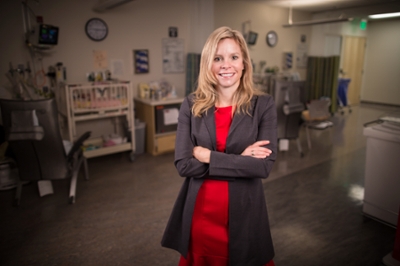For most new parents, the first hours after a baby is born are a haze of overwhelming exhaustion, joy — and stress.
It’s not the ideal time to review a legalistic informed consent document.
Newborn bloodspot screening is routinely done for babies shortly after delivery and involves a battery of tests for between 36 and 50 conditions, including Phenylketonuria or PKU. But many parents don’t realize some states save the residual bloodspots after screening for use in scientific research.

Traditionally, parental permission has not been required for research using such biospecimens, but national standards are changing rapidly.
The College of Nursing’s Dr. Erin Rothwell, using a four-year, $2 million federal grant from the National Institutes of Health’s Eunice Kennedy Shriver National Institute of Child Health and Human Development, along with co-Principal Investigator Dr. Jeffrey Botkin, are developing a tool to educate parents about the leftover bloodspots and their potential use in future research.
Rothwell’s Video Informed Consent Information (VICI) project comes at a time when researchers across the country are trying to prepare for changes next year to the so-called “Common Rule” for the Protection of Human Subjects. Congress reauthorized the Newborn Screening Saves Lives Act in December 2014, requiring that newborn bloodspots collected in every state be treated as biospecimens, changing the landscape for a host of disciplines that use the dried blood for study.
Until the change, consent forms were not necessary for the storage and use of millions of newborn bloodspot tests collected every year.
But soon every parent — hundreds of thousands of them — will have to sign an informed consent document after their child’s heel is pricked. Mothers and fathers will have to decide to bar or allow future scientists to mine the anonymized flecks of blood to study everything from childhood leukemia to the impact of environmental toxins on a fetus.
At the same time, the rule could impact research using specimens ranging from blood left over from cholesterol tests to tissue from cancer biopsies to remnants of surgical procedures.
“This is going to change the whole paradigm of biospecimen research,” says Rothwell, co-principal investigator. “People don’t understand paper-based consent. It’s lengthy. They don’t want to read it in the hospital. So how do you get consent? And how do you get consent that’s meaningful?”
Rothwell and her partners want parental consent to be given much earlier in the process, at a prenatal visit, and using an easily accessible technology — a smartphone or tablet app.
Both obstetrician/gynecologists and pediatricians note there’s a mental gap for many parents between prenatal care and newborn screening. While many patients see pregnancy, birth and well-baby visits as one streamlined process, the handoff from gynecologist to pediatrician can make explaining informed consent and following up with genetic screening difficult.
The goal of the VICI project is to use an engaging platform at the hospital to improve the consent process in the first few hours and days after birth. Future steps will link parental decisions during prenatal care about the storage and use of leftover bloodspots to when newborn screening is conducted.
“There is somewhat of a disconnect for parents after giving birth,” says Dr. Nancy Rose, professor of obstetrics and gynecology. “Parents are emotional and overwhelmed, making it a difficult time to broach the subject of genetic screening on their newborn.”
The team of University of Utah scientists will develop a series of progressive questions that walk parents through the implications of the decision they’re making. For example: How long will this blood be stored? Will my child’s genetic information become public? Can I opt out at a future point?
Along the way, researchers will be testing the video tool to determine its effectiveness in informing parents. Currently narrowing the list of educational questions through focus groups, the team hopes to have a video prototype ready by next summer. Clinical trials would start in January 2017.
Once informed consent becomes universal next year, there’s a chance that more parents will choose to block off their baby’s bloodspot from future research, but Botkin, a pediatrics professor and university associate vice president for research, is hopeful that won’t be the end result.
“This has highlighted the need for being more transparent with folks about how the system works and offering efficient and effective opportunities for letting people know about their choices and how this material would be used,” Botkin says.
“Everybody’s hoping better information and getting parents’ permission will put the system on a stronger ethical foundation without undermining the value of the resource itself.”
Rebecca Walsh
Communications Specialist, College of Nursing